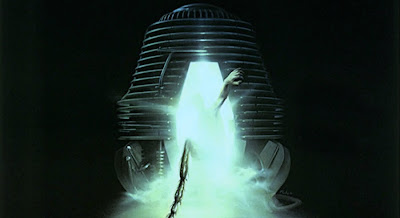David Cronenberg's
The Fly premiered almost forty years ago this month and seems to have been largely forgotten. (While other US movies from the period continue to receive attention and accolades --
Hannah and Her Sisters,
Platoon,
Back to the Future,
After Hours, friggin'
Blue Velvet.) Upon release it was generally (Kael, for once, got it right) dismissed as just another Hi-Tech remake and gross-out movie. It is instead one of the great works of the 1980s, a movie about separation and loneliness, fear of love and sex, fear of communion and hope. It is about Reaganism and what the 1980s did to our emotional culture. Consciously or not (we know Cronenberg's father died during production of a terrible cancer), the director seems to have sensed that we were taking a turn, that our hearts we're growing quieter, something of the best in human life was now going away forever; that what was public and communal would now be forced back into the darkness of privacy; from now on we would have to look more inward for satisfaction and understanding, through imposed hatred of all things public and the increased dominance of technology. Very hard to watch, it is a movie of overwhelming pain and sorrow and loss, with only three major speaking-parts in its almost 100 minutes.
Seth Brundle (Jeff Goldblum) is a genius scientist who works and lives in a warehouse on the dark side of the moon, his only companions being his lab animals. At a science convention Brundle meets a magazine reporter (Geena Davis, Goldman’s soon-to-be-wife of three years) who takes up the goofy and earnest man’s invitation to see something which will “change the world as we know it.” Indeed. And Ronnie (the reporter) hands over one of her silk stockings after flashing a gorgeous leg right after arriving at his warehouse. Her first stance toward him, however, is a rather knowing condescension – until he demonstrates what will change their worlds: he “teleports” the silk stocking from one “telepod” to another (initially she calls them “designer phone booths”). She rushes back to her magazine’s editor-in-chief, a typical prick mediocrity perfectly played by John Getz. Seth is outraged and he convinces her (and the editor) to wait. He offers to bring her with him, step-by-step, until he and his travel/space revolution is ready to launch; and in hopes she will along the way fall in love with him. She does. Almost from the moment she does, he (literally) begins to fall apart. And the rich red aroma of sorrow – embraced by Howard Shore’s Grunenwald-like score and captured by DP Mark Irwin’s Tintoretto darkness – descends like a mourning veil.
Brundle is a man who wants nothing more than to love, to be part of something other than his own mind. Something not in his nature, or destiny, for him to have. He follows his self-destruction and lonely descent into hell with purity and courage. He does not fight it. It is all he really knows. After successfully teleporting a lovely baboon (his first attempt was not successful), Ronnie suddenly leaves him – to finally rid herself of the prick boss/ex-boyfriend. Within moments of her leaving, Seth begins to fade, feel insecure, jealous and possessive. He drinks, gets quickly drunk, and in a stupor decides to teleport himself before the pods are ready. Successfully he believes.
Ronnie returns to him and they fall. At first, she makes him feel like a sexual superman. When we next see the couple in public, Seth is in full Yuppie regalia, turned into a would-be Don Johnson. He's now rocketing and she cannot keep up, she is too sexually square for this once and future shut-in. So he dumps her, after degrading her. “I don’t need you anymore! Never come back here!” He decides to prowl the streets and kick some Gentrification City ass. (Literally Toronto but a stand-in for Portland or Seattle or Park Slope or some other pseudo-hipster shithole). After breaking an arm or two in half, he feels like the toughest stud in town.
Apart from Ronnie, the descent is fast, as he quickly becomes as physically repulsive as he must have feared he was his whole life. After a month, he asks her to return. He has been turned – like the failed attempt with the first baboon – inside/out, his fear and self-loathing now exposed for her to see. She has no choice but to turn away.
SETH
I’m an insect who dreamt he was a man,
and loved it. But now the dream is over,
and the insect is awake.
She shakes her head. But soon, Ronnie will plead with Getz to arrange an immediate abortion, words Seth will hear:
RONNIE
You should have seen him!
There could be anything in here,
in me, in my body. . .
I don’t want it in my body!
Penultimately, she is to kill his baby. Finally, he commits suicide by begging his loved one to murder him.
He also instructs her about Insect Politics:
SETH
Insects don't have politics.
They’re very brutal.
No compassion.
No compromise.
We can’t trust the insect.
A perfect description of our post-Reagan world, and never so anthropodic as in 2023.
Only three characters speak for the movie’s first 50 minutes. (Five minor roles later include Cronenberg as Ronnie’s gynecologist, and a very nice and sexy turn by Joy Boushel as Seth’s bar pickup.) Getz is serviceable (and heroic at the end). Davis is beautiful and moving throughout. But the greatness of Jeff Goldblum is hard to describe or compare. Not for a moment does he hide beneath the make-up or technology. Unlike his character, he is a man to the end.
BrundleFly is what we have become, what we have been forced to become. On our way to becoming what Seth is at the very end: part-human, part-heartless insect (or should that be iNsect?), part-thing.
Be very afraid. . .

